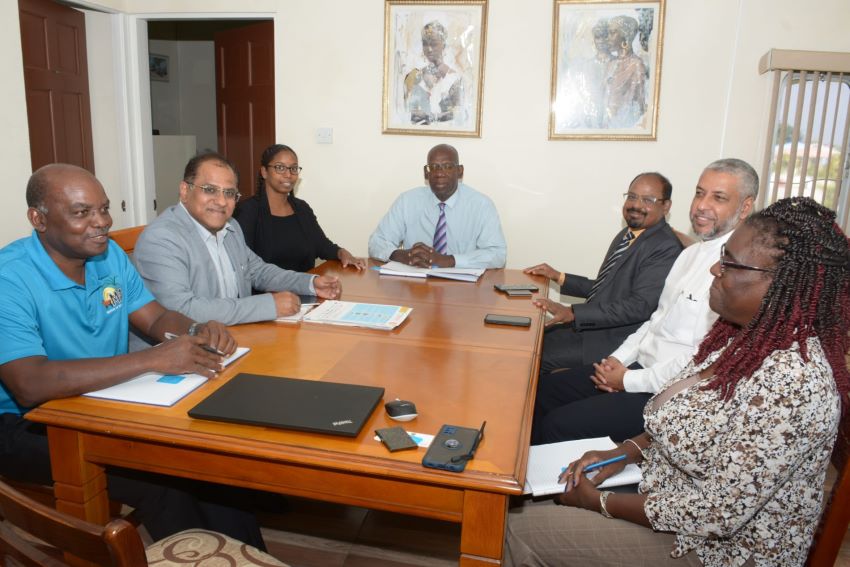
(L-R) Chief Economist Acting, Robert Saul; Managing Director of Bajaj Processing Pack, Girissh Bajaj; Chief Agricultural Officer, Keeley Holder; Acting Permanent Secretary (Ag), Ministry of Agriculture, Food and Nutritional Security, Anthony Wiltshire; Muslim Community Rep, Suleman Bulbulia and Senior Administration Officer, Carolyn Estwick-Best. (F. Belgrave/BGIS)
Ways in which India could support Barbados’ agricultural industry were explored recently when High Commissioner of India to Barbados, Dr. Shankar Balachandran visited the Ministry of Agriculture, Food and Nutritional Security, at Graeme Hall, Christ Church.
Acting Permanent Secretary, Anthony Wiltshire and Chief Agriculture Officer, Keely Holder, who attended the courtesy call, indicated that the Ministry was ready to commence planning for critical areas needed to improve the Barbadian agricultural sector.
A major project highlighted was a national packhouse to facilitate 30 to 40 different types of fruits and vegetables. The Ministry officials noted that the packhouse would be used to wash, dry, grade, sort, and cut fresh produce, bulk and retail pack items and extend the shelf life with cold storage.
Ms. Holder, who also said the Ministry had been facilitating a sweet potato export project (under the Crop Accelerated Growth Enhancement programme), told the High Commissioner that a high percentage of sweet potatoes are not suitable to be sold as fresh sweet potatoes in the export market.
As such, she indicated that an agro-processing facility for processing large volumes of second and third tier sweet potatoes into value-added products may be an area to explore with India given its vast experience with producing agro-processing machinery for small and medium-size operations.
Noting the location of Barbados and that such a modern facility would be beneficial, Dr. Balachandran stated: “The US, for all of us in the Caribbean and everywhere else is one of the very huge markets, but when you talk about exports, that’s importing to the US; you have to meet the phytosanitary conditions of the country. That unfortunately is not met by most of the countries because they don’t have these facilities.
“This would be Gamma radiation of mangoes; this would be hot water treatment of mangoes, sorting grading of mangoes, you know, more scientific in a more arranged way. As a result, the access to that market is lost and I believe that CARICOM has this huge advantage of having free access to that market (United States of America) provided that we are able to cater to their phytosanitary requirements.”
He acknowledged that India was willing to help and said: “So, this is where we come in. For example, if there is a mango processing area, we can set up such a facility which can be used by the exporters and the farmers to process the mangoes to meet the conditions of the US and then be able to export. That’s the kind of facilities we’re talking about.”
Dr. Balachandran also recommended that Barbados and other countries in the region plant millets. He added: “Barbados is in a position to cultivate millets because you don’t have much water, your land is suitable for millets cultivation and these millets are very hard and the shell doesn’t attract much insects. It can survive in the harsh climate here and it commands two to three times the price of rice and wheat.”
Other topics discussed were grants; productivity education and training for small to medium farms; equipment for specific soil content; agro-processing; technical training and education and turnkey facilities.
